Thanks for warning. I'm glad you've already done it. Thank you for all the time you have invested here.
comment on next post*
There are so many suggestions, but I have here for you, whoever you are, an ordinary map based on the world created by this simulation. This card reflects to which ancestor, from which the nation originated, this or that power belongs. At the very beginning there were a hundred of them, now there are only five original places of appearance of all the local countries, of which three have almost died out. A kind of cultural map of the world.

> 6. make the army more realistic by making it move and spawn
And I'm against it. This will complicate the modeling process without introducing anything particularly new. Perhaps it would be appropriate to use the presence mechanic, where the army is an abstract value that is present on the border and can change in accordance with the priorities and interests of the civilization.
> 8. aggressiveness percent (the more agressive the more chances it will attack nations)
Adding this isn't worth it, as it was a stub of possible culture mechanics. It is better to take on the embodiment of a deeper and more interesting mechanics that can reflect both aggressive and peaceful nations.
> 10. sanctions so where a nation can make a sanction to a country to make that country weaker and less chances of getting trades (see 11.)
Sanctions are presented not only in the form of an embargo, but also in other forms of severing ties and pressure. I believe that a deeper model of diplomacy should be worked out for this. Sanctions in a good embodiment are something too far away, as it seems to me.
> 11. trades so they give money (see 12.), land and army
> 12. money, so that they can use it to purchase land
Without an answer to the question why money is needed, in addition to acquiring land plots, it will be meaningless.
> 15. make boats so they can go in crossing and water to settle or attack territory
In the absence of mountain tiles, I use water tiles for this. So the map becomes more interesting or what? I'm not opposed to your idea, but for this I would first of all ask you to add mountain cells to the map editor.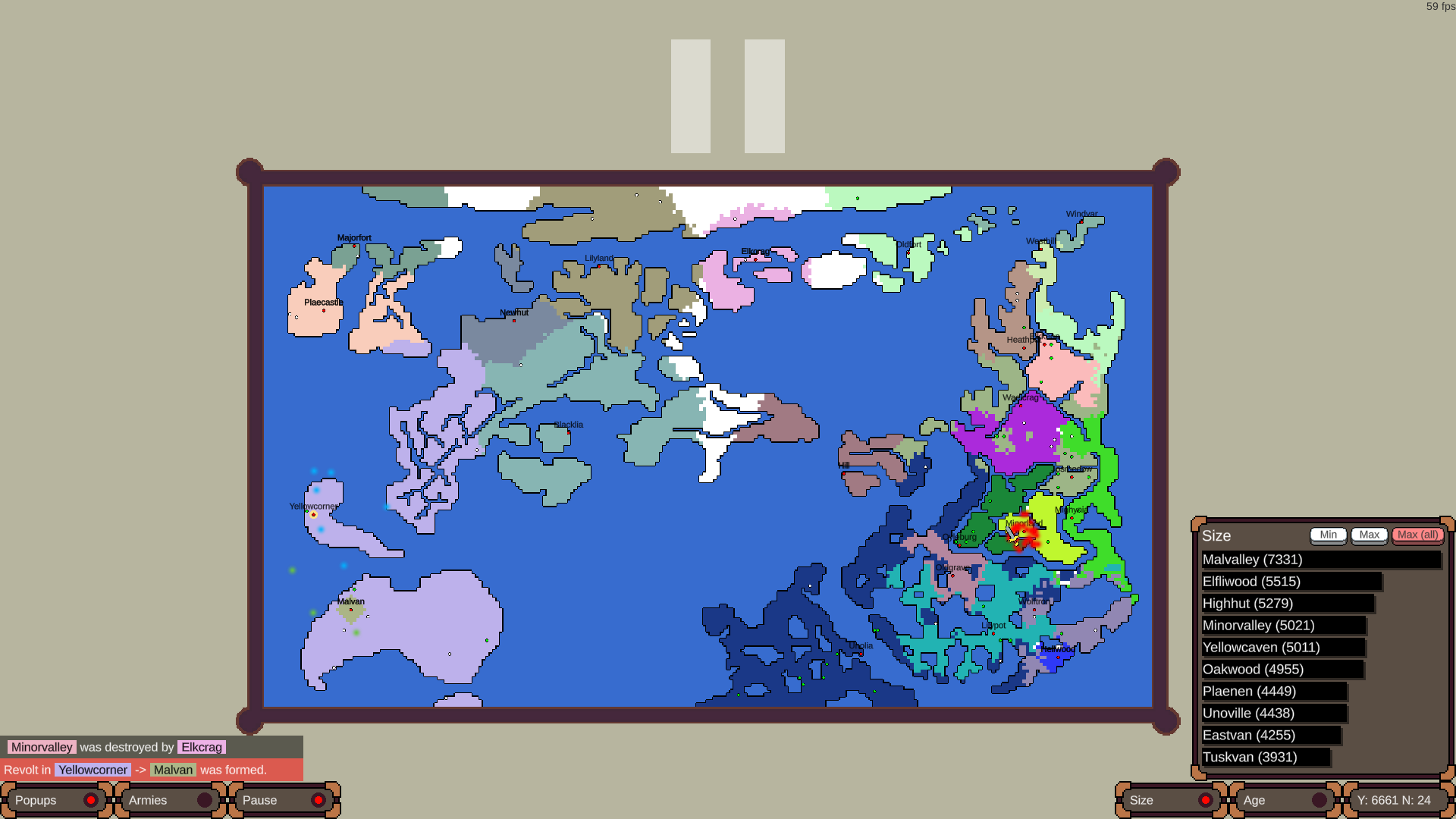
You came up with a very interesting system with rebels and nations. At its core, for now, this may reflect how empires have affected the world, for eventually some, if not all, of the world will be rooted in a single state. I believe this will work very well with the culture mechanics that will hopefully be added to the simulator soon. Look at this as a cellular automaton, a simulation of microorganisms: stronger colonies capture a petri dish, and after that, all living things in this dish will be related to that very dominant one. You can also borrow some natural processes and the micro world. For example, some microorganisms transfer part of their DNA to others, which can be written into the mechanics of cultures.
Grandline under the great Non-Carolingian declared himself the new Emperor of Grandburga and died. The inheritance was divided by nine sons. The restoration of the Great Grandburg Empire was in progress. On the anniversary of the collapse of the empire, a millennium after the fall of Grandburg, in 7547 from the birth of mankind and in 1514 from the birth of the great prophet-emperor, the end of the world was declared. The site with the simulation of this world has been disabled. End.
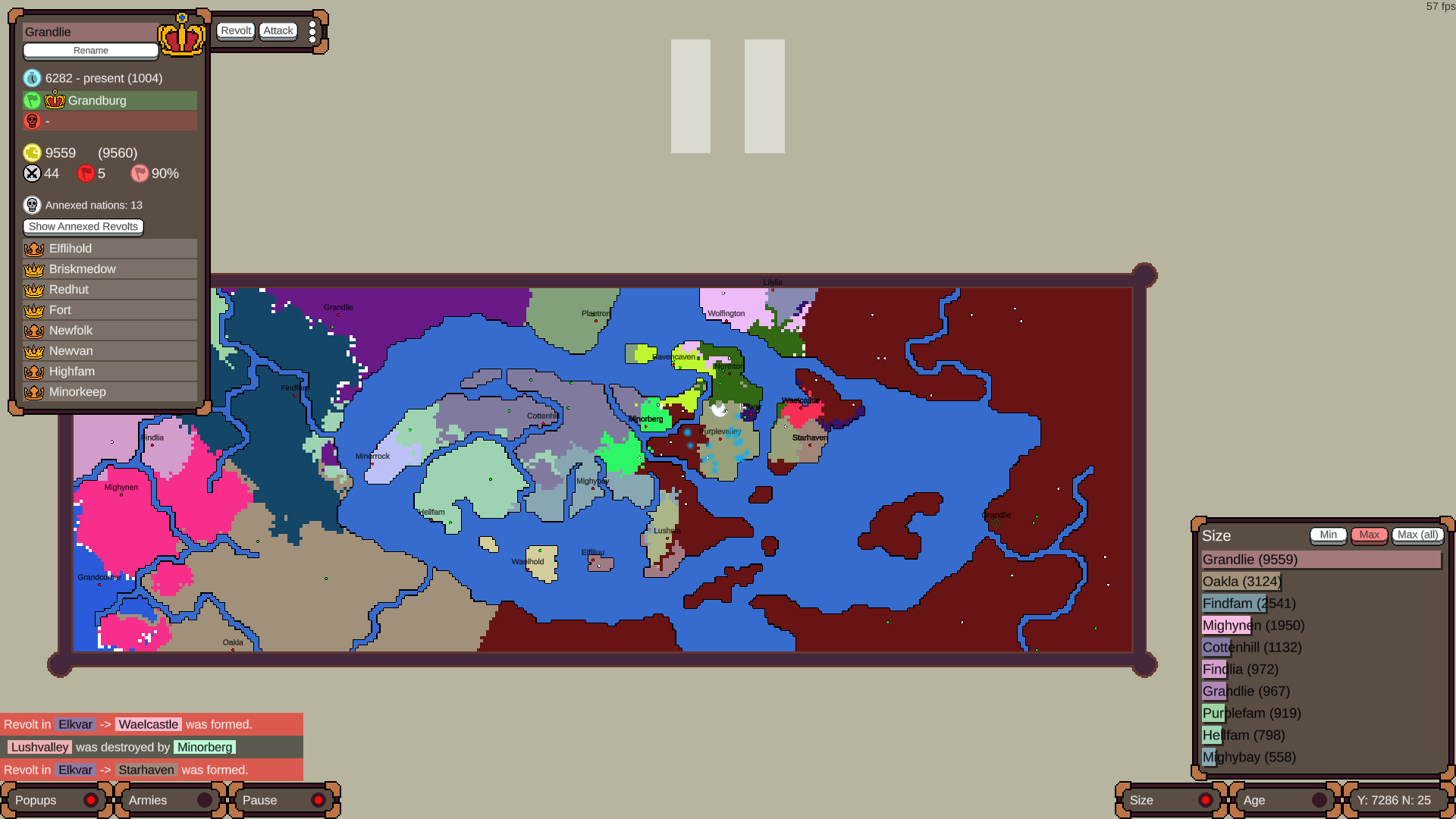
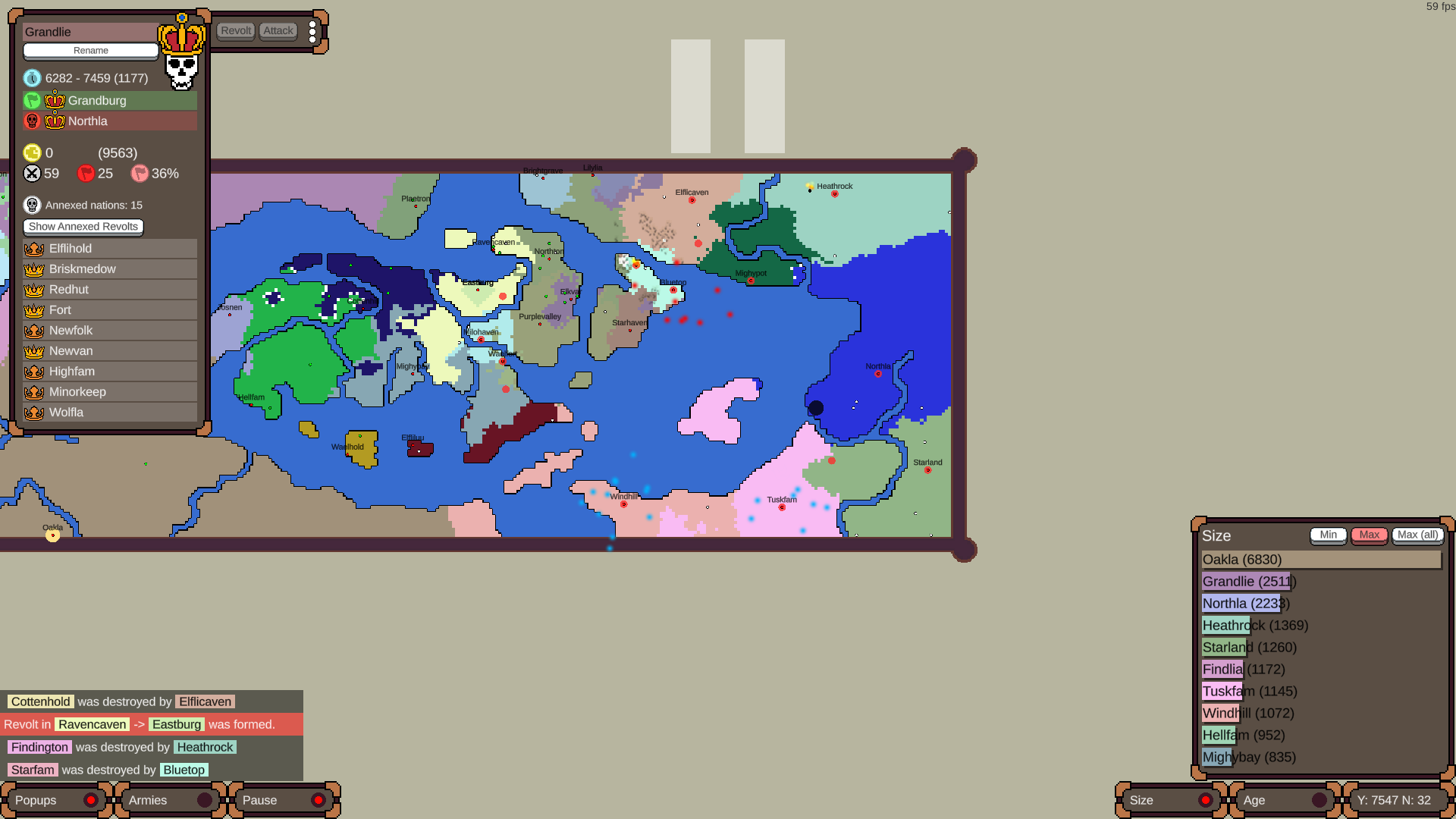
It is UNEXPECTED, but after the defeat of the Empire, they did not last for thousands of years. Thank you General, you doomed a great nation to endless local conflicts over five centimeters of disputed territory on a nameless river. General, you have cosplayed unfortunate Italy, and the dictator Spaghettilini and the cringe war in Greece are waiting for her from now on.
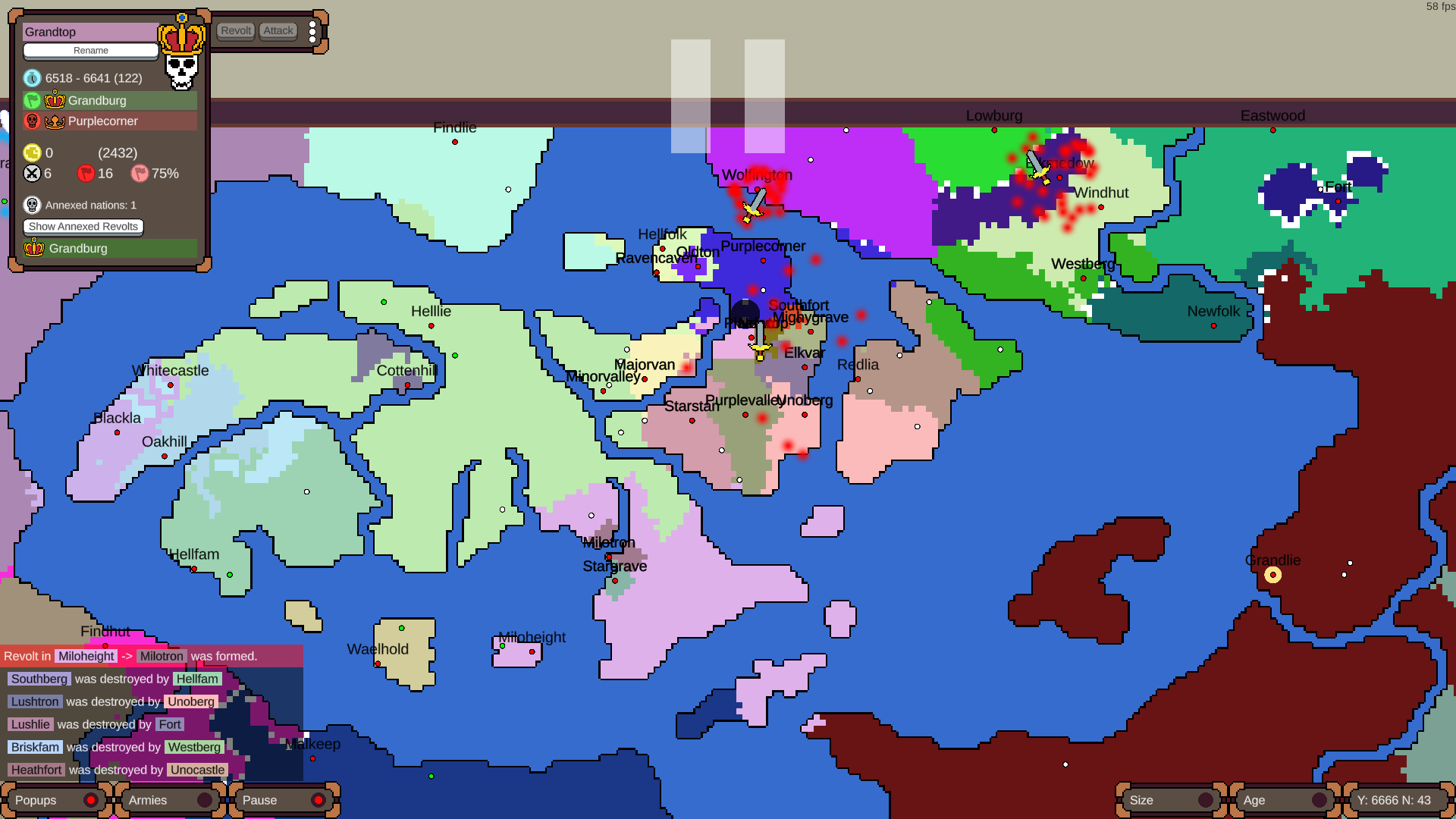
From simple to complex, in my opinion, has always been the right way. It is impossible to start from scratch, without resources, a team and everything else, to accurately recreate or surpass Europa Universalis VI.
I have read and noticed that you are planning or at least thinking about implementing the mechanics of science. I would like to propose a simple and authentic way out: let the AI learn not certain discoveries, but abstract ones, like certain power-ups. So the gameplay will not be limited to certain historical periods and the player can simulate absolutely any event from the capture of Constantinople to the collapse of Yugoslavia.
I'd like to suggest a small correction: I don't think it's correct to equate water tiles with a crossing to land tiles in everything from "army" movement speed to "ownership" itself. If you put "army" for "military potential" or for "power potential", although I don't know how you could implement this, it would be possible to allow more than one AI to "own" a water cell. Or perhaps we could slow down the expansion rate and limit the ownership of water tiles to the distance from the ground tiles owned by the AI. Here, in a word, if technology appeared, it would be possible to simulate the colonization of America, because now any country that has got a way there can colonize it.
You can see in the attached screenshot that I also used regular non-movable water tiles as mountain ranges. It's more about the textures or color of these cells than about adding new states, but the mountain cells are probably the important thing.
Well, and some cosmetics. I don't know if you use predefined lists of names, but don't we have name generation tools? I know one of these: the use of the words of a certain language, the names of cities and regions as material for a method of creating new words, very similar in structure and sound to this material, but different from it. If you are interested, I can describe in more detail. Then it seems to be great if the AI had certain titles coming from the parent countries. For example, here in the screenshot I have the Crac Empire. The first of the empires. Why not add this "Crac" before or after the name of the state in honor of this. Far from all, only those that rebelled from this country or neighbored it, being of the lowest rank, and then reached the same rank?
Well, the last. GIVE THIS DOWNLOAD AND SET MAP SIZE 20000x20000
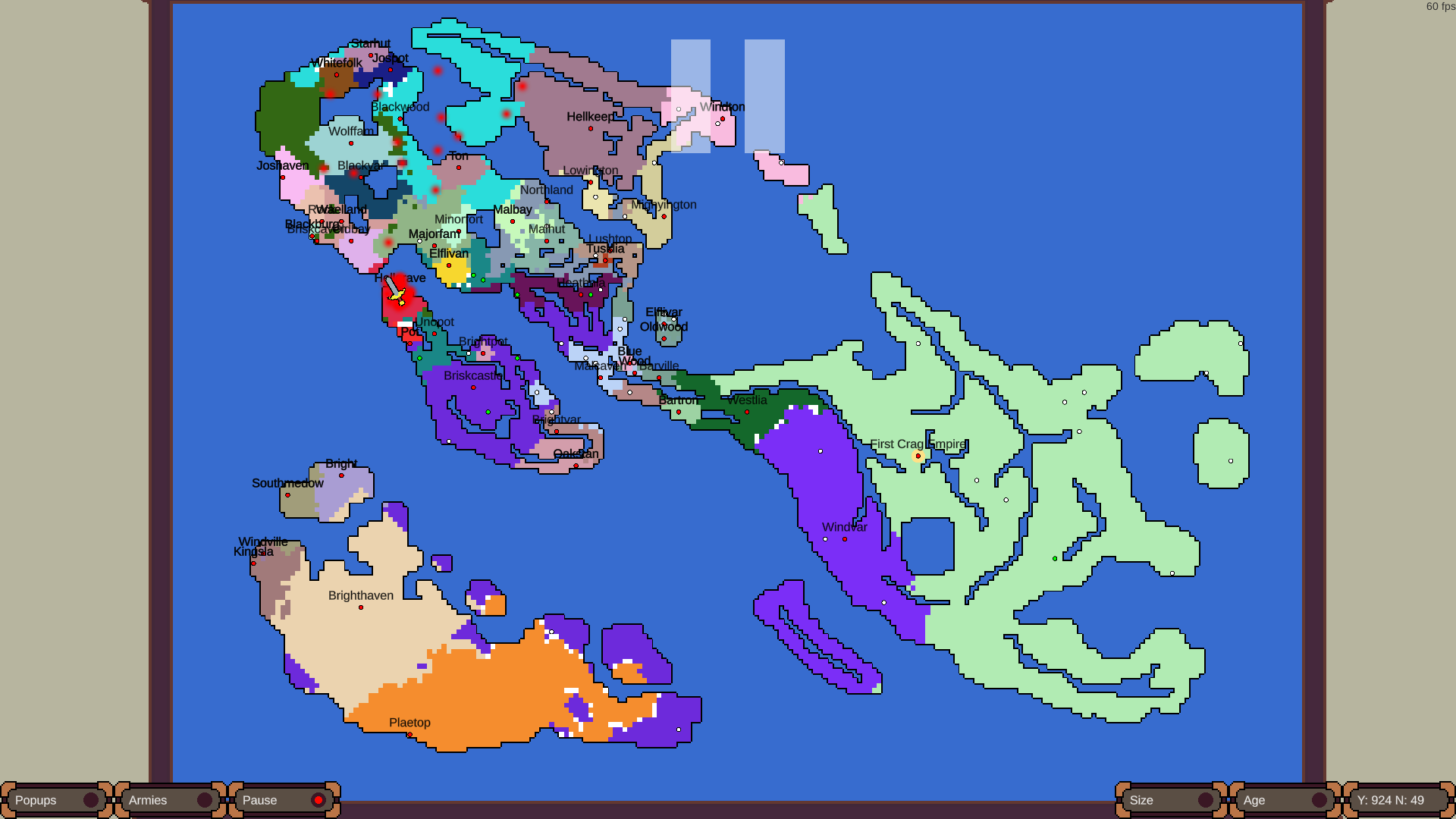
"So I need to use algorithms that can account for these changes when calculating their geographical properties. The last thing I want to do is recalculate the values for those properties from scratch every single time an action occurs, as this would slow down the game noticeably." - Am I right in understanding that you are not going to introduce any other ways to optimize these processes yet? I am a person far from the code and it is difficult for me to judge, but it seems to me - correct if I am wrong - it would be possible to carry out the work of this code at the time of the player's call by making a cooldown of diplomatic actions, and the AI could directly interact with the factions in the tribe, so that do not overload the simulation. I could misunderstand the meaning of the sentence, since I translate everything through Google's auto-translator. Sorry for the inconvenience.
Is it possible to make clans move to a stronger tribe even if their relations are not very good, but rather neutral? And if so, then you can go from the opposite, implementing a mechanic in which the clan could refuse to join, despite the cordial relationship, if the tribe does not have enough strength to keep it. In addition, I think it could look like a scale of relations, on which there are certain zones of "possible diplomatic actions": depending on the characteristics of the tribe, these zones could move, change their size or disappear altogether.
If you think about it, one way or another all wars began for an uncomplicated reason - economic gain. You can, of course, play with casus belli so that the AI is looking for the most optimal conditions, due to which it begins to expand, but everything should be reduced to expanding the economic base, otherwise we will end up with non-viable tribes and the so-called. "colorful spaghetti" (as translated by google translator). An example is the Crusades, the beginning of which was, as was discovered later, an attempt to break through the "siege" that closed trade routes from China and, in fact, plunged Europe into centuries of cultural, economic and scientific isolation. Until there are any significant aspects of the state structure and economic model (and trade) in the simulation, it is too early to talk about it.
Why not bind the new function, as an example, to the "authority" or "isolation" of the tribe - so that these parameters grow or fall depending on the action? And I deeply hope that there will be many more in the future. Dmayu would allow soft regulation of the size of the tribes, and it would also be more practical to reduce size regions for the same purpose.
Looking forward to working in the future with a new economic model focused on energy - processing, source and consumption. Until then - which would be easier than reworking the base - you would allow not only activities to be added through modification, but also to expand the types of its influences. When you start working on the first one, the second not only won't hurt, but it will be useful.
If you look at the development of human civilization, you can notice three main types of activity, or it would be better to say the phenomena that empires and societies disposed of: energy - whether it be food or coal for heating blast furnaces; unit of energy conversion - an instrument that was originally a person; the way of using energy is population expansion, when a person himself consumes that energy, or technical, when it takes the form of more efficient energy conversion tools. It's easier to simulate, and it seems to me that it would be believable; such a systematization of modeling processes will allow us to see both the development and decline of societies.
I take it you are no more than 14 years old, right? Sorry for asking this, but if you want, could you please tell me why you chose the current image as your avatar? I doubt that you have any idea of the structure to which this emblem belongs, and therefore it throws me into a stupor. Not that I have contracted the leftist tendencies of the West — I’m not writing because this is “unacceptable” —but out of curiosity.
Is it possible to make one mechanics for religions, and for philosophical movements, and for ideologies - any of the above, to one degree or another, fundamentalism, wrapped in different wrappers. How not judge, but dogma is the heart of all that. I mean, by the contribution to culture, we could judge whether this dogma represents a belief or just an idea that is held; factions, and even significant persons, are not required to have a certain view of things, and only a certain cultural influence of fundamental thought and its dogma could influence, he will make a decision, relying on the first or second - he will act in accordance with generally accepted norms that have become a religion, or a new idea, be it more material, like ideology, or philosophy, if it is more psychological and metaphysical. So we will avoid too much detail, and in accordance with the new trend of historians and mathematicians, we will simulate the masses. How do you think ?
As for the vectors of development of dogmas: I believe, basically, what is often under the close supervision of those suffering - nihilism or idealism, mysticism or materialism, egocentrism or collectivism, ecocentrism or anthropocentrism. If we put them as a basis, this will reflect both Christianity with socialism and nationalism with capitalism - in the first idealism, collectivism, mysticism and anthropocentrism are expressed, in the second there will be nihilism (it should be admitted that recently, due to freedoms, there is more I think) materialism, egocentrism and also anthropocentrism - the matter, as they say, is in dosage. However, I doubt that exactly the Named will be presented in the simulation, since it will be expressed bias and subjectivity; more abstract forms are more acceptable.
I'm glad you liked it :)
It seems to me that events are not always interconnected with the discovery, sometimes representing the heralds of bitter news. Sorry, we can always depict that the modifier is due to the discovery event, as I demonstrated with the personality event (or politics).
Yes, I think it would be interesting if you introduced an invention. This would make it possible to more specifically study the development of certain states, and you understand that - this is great!